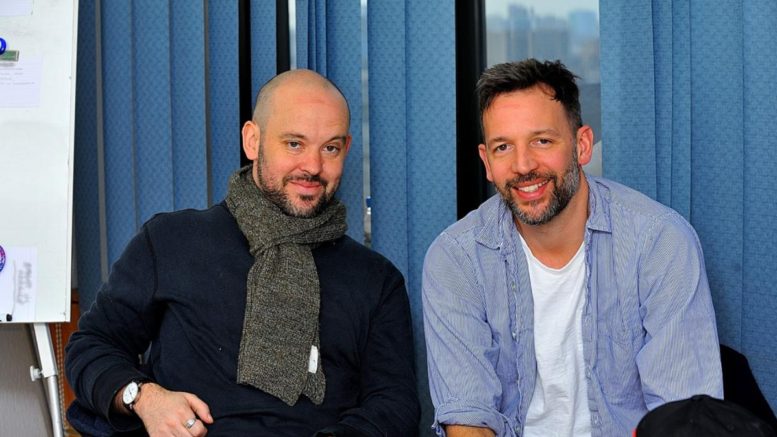Tim Telling, Editor of The Daily Mash and lead writer on BBC2’s The Mash Report, sits down with The Porter’s Log (via skype) to talk satire, social media and starting a TV show.
There is something fitting about speaking to Tim Telling via the internet. After all, The Daily Mash is indisputably the king of online satire in the UK, attracting millions of viewers every month with its offering of spoof news and opinion pieces. Recent headlines include: ‘UK economy now 92 per cent paintball’ and ‘Declassified JFK files reveal he’s fine’.
Founded in 2007 by former journalists Neil Rafferty and Paul Stokes, The Daily Mash currently has a core team of “ten or eleven” writers based all around the country who pitch and write most of the stories.
“We see ourselves as real news from an alternate universe. We try and operate as a news outlet,” says Telling, who has edited the site for roughly five years.
Just like any news outlet, the website has its own style. For the Mash this means short, punchy articles featuring regular names such as Tom Logan and Professor Henry Brubaker from The Institute of Studies.
“Over the course of its life The Daily Mash has built up a certain tone it’s known for”, says Telling. “It’s quite irreverent and has a lot of attitude but it’s also it’s also a bit absurdist.”
Does this mean there is a formula for writing a typical Mash piece? Telling shakes his head.
“We have a format but the lifeblood of all these things is creativity. You’re always looking for a sweet spot where the piece has some Daily Mash characteristics but is sufficiently original too.”
But funny and original material is not always enough to make a piece a hit. Aside from the odd spin-off book, the Mash is published purely online, which means that articles need to stand out on people’s newsfeeds. It is up to Telling to ensure stories make a strong first impression.
“The headline is what sells it; it’s absolutely fundamental so I’m always looking for maximum energy. Sometimes it just rests on a little turn of phrase so often I will change something and then change it back multiple times until eventually I’m just like ‘sod it, I’m gonna publish this’. Sometimes switching one word will just make it fly. It’s a dark art.”

The Daily Mash often takes aim at everyday annoyances
Some things, however, are out of his hands. With so little known about how Facebook and Twitter’s algorithms work, we wondered how much Telling tailors content to make it suit these platforms.
“We don’t change the core ideas to suit Facebook but we sometimes perhaps change the way the ideas are presented and make them more shareable”, he says.
At the time of writing the site boasts over 660k Facebook likes and 130k Twitter followers.
“I don’t actually use social media in my personal life so in a sense I’m probably one of the worst people in the UK to be doing this job”, he says. “I genuinely haven’t got a clue about any of that stuff.
“But the fact of the matter is we are massively reliant on social media to disseminate our stuff. They’re the puppet masters and if they want to f**k with us they can.”
For now, it seems, the Mash is safe, at least until Mark Zuckerberg reads what they have written about him.
In any case, much of the site’s output does not react to the news cycle, which even in this fast-paced world of online news Telling describes as “the same old bullshit just different things”. Lots of their pieces instead take a satirical look at more everyday aspects of society. One of the most popular Mash pieces of all time is entitled: ‘It wasn’t worth it says 103-year-old vegetarian’.
“My personal philosophy is to put being funny before making a good point. The primary purpose of the site is to be funny so if we’re making people think, that’s great, but it’s a bonus. We’re in the business of comedy.”
Seconds later, however, the satirist in him rears its head: “But I do get pretty angry about stuff and it’s really cathartic to have some agency, some way of sticking it to people you have contempt for. So it’s very hard to separate the two.”
Topical satire and surreal social commentary are also the main elements in The Mash Report, the BBC2 show hosted by Nish Kumar, which was broadcast for four weeks in the summer. Telling is the lead writer.
We asked if having a mainstream TV show compromised the anti-establishment, DIY-spirit of The Daily Mash.
“I believe that it’s absolutely possible to be popular without being populist”, Telling says. “It takes our profile up a step but I don’t see it as putting any pressure on us to compromise.”
He talks admiringly of The Simpsons which he sees as the perfect example of a show that has “great characters and great stories” and also makes “lots of smart satirical points”.

Nish Kumar hosts The Mash Report (Image rights: BBC)
But Telling sounds exasperated with the pressures involved in launching a satirical program on this side of the Atlantic.
‘I think with satire there’s always this journalistic trope that pops up, with people asking: ‘Is it going to be the British Daily Show?’ I’ve never even watched a whole episode of The Daily Show and very few people over here have. It’s actually quite hard to watch The Daily Show in this country, irrespective of whether you want to.”
After a long hiatus, the first series of The Mash Report will return to our screens in January. As Telling himself says, “the spotlight is on”.



